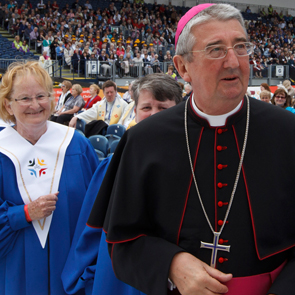Two of Ireland’s most prominent dioceses say responses to the Vatican survey on marriage and the family reveal a gap between Church teaching and practice.
Archbishop of Dublin Diarmuid Martin said the responses to the questionnaire indicated a “theory-practice” gap in relation to the Church’s teachings, which were poorly accepted and disconnected from real-life experience of families. His remarks relate to answers given to questions on contraception, Communion for divorced and remarried Catholics, and same-sex unions.
Respondents in the Archdiocese of Tuam indicated, for example, that while Humane Vitae, Pope Paul VI’s encyclical banning artificial contraception, was for the most part well understood, it was not generally accepted. The decision by Dublin and Tuam to publicise the survey findings contradicts an earlier statement by the Irish Bishops’ Conference that none of the results would be published. A decision not to publish has also been taken by the Catholic Bishops’ Conference of England and Wales.
The Vatican asked bishops’ conferences last year to circulate the questionnaire as widely as possible so that the findings can be considered by the synod to be held in Rome in October on the theme of “Pastoral challenges of the family in the context of evangelisation”.
A spokesman for the Irish bishops said two weeks ago that the results from the survey would not be released because it was “a matter for the synod of bishops and not the local Church”, adding it would “undermine the integrity of the information collection process”. But Archbishop Martin revealed some of the survey findings at a meeting for priests and parish council members in the north Dublin deanery on 27 February, while Archbishop Michael Neary published some results in the Tuam diocesan magazine.
Archbishop Martin cited one reply, which stated that “Church teaching often appears theoretical and remote from an understanding of the real lived experience of couples”, while another responded, “a lot of preaching and teaching does not relate to everyday life; it is above the head of struggling and hurt people”.
On cohabitation of couples before marriage or due to divorce and remarriage, concern was expressed about the high number of people in this situation.
“Many spoke of these people suffering, feeling guilty, feeling marginalised, feeling excluded, feeling hurt, even despised,” the archbishop revealed, adding: “The strong pattern in the responses was that there should be an attitude of openness and compassion, outreach and welcome to these people, with less judgment and more listening to their experience.”
The survey respondents also stressed that children should never be victimised in such situations and that if parents wished their children to have a religious education they should be welcomed in love.
Regarding same-sex relationships, some respondents in Dublin saw the Church’s position “as being purely negative and judgemental” and many felt there should be some way of civilly recognising stable same-sex unions although there was uneasiness and opposition to gay marriage.
In Tuam, respondents said the rate of cohabitation before marriage is “very high” and that “it was felt by some that there was a sustained cultural/secular campaign to normalise this situation and society readily accepts this.”
On same-sex marriage it was stated: “The pastoral care of homosexual persons has not been as sensitive as it might have been.”
This week, the Catholic Communications Office in Maynooth appeared to signal a shift in the position on whether dioceses would share the synod survey results.
Above: Archbishop Martin at the 2012 Eucharistic Congress in Dublin




 Loading ...
Loading ...